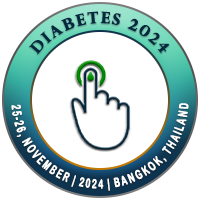
Ivanka Dimova
Medical University Sofia, BulgariaTitle: Increased methylation of tumor-suppressor genes in patients with type 2 diabetes mellitus
Abstract
Background: Genome-Wide Association Studies (GWAS) has identified and
confirmed a number of genetic variants for susceptibility to type 2 diabetes
mellitus (T2DM). However, these findings explain only small part of the overall
genetic risk for the disease, which necessitates new studies to clarify the
relationship between genetic factors and the clinical manifestation. Epigenetic
factors are most likely involved in the complex interaction between genes and
the environment. Studies on epigenetic factors in the genesis of the complex
diseases are not yet sufficient. Therefore, epigenetic studies could shed light
on understanding their pathogenesis. The most studied mechanisms that are known
to affect the epigenome are DNA methylation, histone modification, and aberrant
expression of microRNAs. Objective: We aimed to determine DNA
methylation levels of genes connected to cellular stress and tumorigenesis
during the course of T2DM in order to understand the role of epigenetic
regulation in their development. Materials and methods: We have
performed analysis for promoter methylation of 22 such genes in blood samples
of patients with these two diseases, compared with healthy controls using Human
Stress & Toxicity Pathway Finder EpiTect Methyl II Signature PCR Array. The
method is based on detection of remaining input DNA after cleavage with
methylation-sensitive and methylation-dependent restriction enzyme. The
relative fractions of methylated and unmethylated DNA are subsequently
determined by comparing the amount in each digest with that of a mock (no
enzymes added) digest using a ?Ct method and mathematical quotation. Results
and conclusion: We revealed highly increased promoter methylation
(associated with gene silencing) of BRCA1, MSH2 and CDKN1a
genes in T2DM patients. This pilot study paves the way to better understand the
complex pathogenesis of diseases with the contribution of epigenetic
dysregulation.
Biography
Ivanka Dimova
has completed her PhD at the age of 32 years from Medical University Sofia, Bulgaria.
She is the head of Laboratory of Genomic diagnostics of Medical University
Sofia since 2015. She has over 100 publications that have been cited over 800
times, and her publication h-index is 17. He has been serving as an editorial
board member of several reputed journals.

